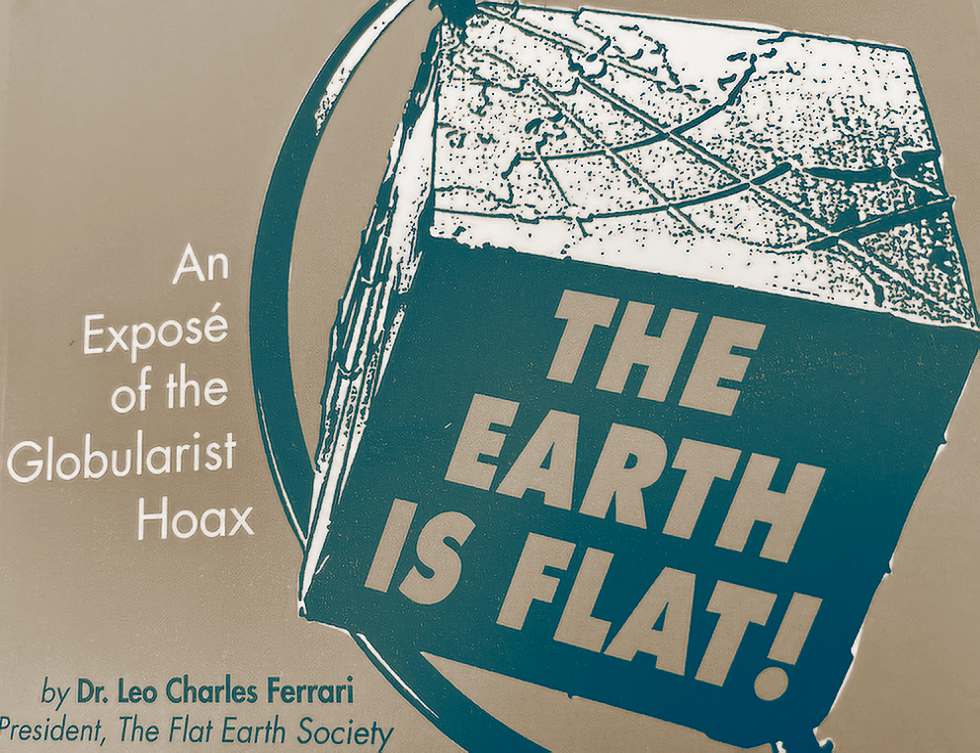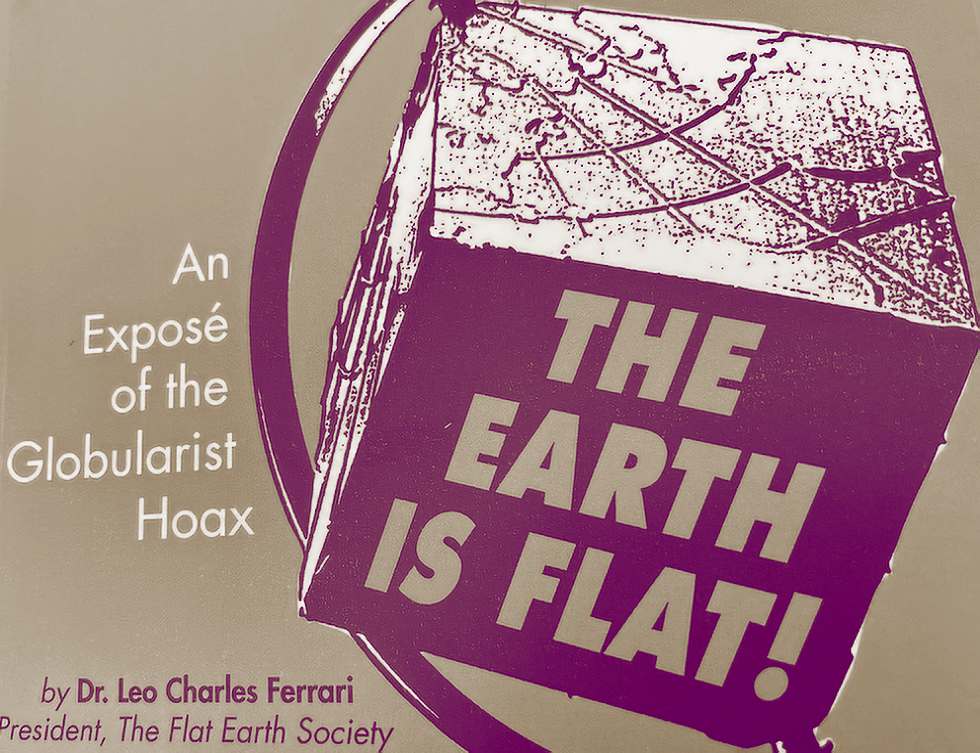
A few days ago, I gave an interview about the Flat Earth movement, where I summarized, in a very brief way, the usual history — created by biblical fundamentalists in 19th-century England, and rescued by other fundamentalists in England itself. , in the mid-twentieth century, then revived in the United States in the 1970s, then virtually extinct in 2001, then revived by the Internet and YouTube since 2004.
This telescopic version leaves out some interesting details. For example, the history of the fundamentalist theocracy in Zion, Illinois, USA, a small town famous for its fig candy and chocolate, and where, in some years of the last century – from 1920 to 1935, roughly – it was illegal to teach children that the Earth Spherical, as decreed by autocrat Wilbur Glenn Voliva (1042-1870).
And another curiosity: the Apollo project, which took astronauts to the moon, made Samuel Shenton (1903-1971), the chief leader and spokesman of the International Round Earth Society (founded in England in 1956), a world-famous figure: journalists on both sides From the world. Atlantic seemed unable to resist the temptation to call him and ask what he thought of images of Earth taken from space. Astronaut Frank Borman (1928-2023), commander of Apollo 8 (the first manned mission to orbit the Moon, and responsible for the famous photo of Earth “rising” behind the Moon's surface) mentioned Shenton by name during a live broadcast made during the historic space flight, televised and followed by approx. Of half a billion Earthlings.
philosophy
But even the story of Zion and Samuel Shenton's space adventures are still part of what we might call “mainstream” flat Earth theory—the sincere belief that the Earth is flat, based on the idea that the Earth is flat. Direct evidence of the sensespurged of any kind of “theory”, added to Literal interpretation of the BibleThis is enough to describe reality.
These Flat Earthers don't exactly practice what they preach (they don't hesitate to invent the craziest theories to distort the evidence of the senses and thus support their beliefs), but that's another story. What distinguishes members of the mainstream are three characteristics: Biblical literalism that motivates them, sincerity How they express themselves and about An unintentional parody of science which they practice; Found, for example, in Experiments which they suggest, in the inept use they make of terms like “magnetism” and in the logic they proclaim: Shenton had begun to “distrust” the shape of the Earth when he discovered that his idea of traveling from one place to another simply by ascending into the atmosphere with a stationary device and waiting For the world to revolve beneath him was impractical.
However, there is another line, less remembered today, but whose influence on the world may have been – and still is – far greater than that of devout flat-Earthers: the Flat-Earther influence. sarcastic Or perhaps better said, philosophical. One of the pioneers of this aspect was the British playwright, writer, and polemicist George Bernard Shaw (1856-1950), who commented in the introduction to his play “Santa Juana,” published in 1923, as follows:
“In the Middle Ages, people believed that the Earth was flat, and they at least had proof of it through their senses: today we believe it to be spherical, not because at least 1% of us are able to offer physical reasons why such a unique belief, but Because modern science has convinced us that nothing is clearly true, and that everything magical, improbable, extraordinary, gigantic, microscopic, cruel, or scandalous is scientific.
Shaw is wrong about what People thought of the Middle Ages (The Earth's sphericity had been proven in ancient times by Aristotle and Eratosthenes, among others.) But the argument there is different: it is a criticism of the automatic and unreflective acceptance of scientific data, Just because it's called scientific. The question implicit in Shaw's flat satirical ground is: If appeals to authority are, in general, an invalid form of argument, why do we place so much value on appeals to authority? scientific?
This is a profound question, and we have explained the answer several times in this regard Questão de Ciência magazine (For example, here, here that it here). The short version is that science, as a collective process of inquiry guided by methods chosen to minimize the risk of errors and biases, tends to provide the best possible description of empirical reality, at a given historical moment. But as these methods and the knowledge needed to interpret their results tend to become increasingly complex, the best non-experts can often do is trust the word – the authority – of the experts. They are not infallible, but within the strict limits of their areas of expertise, they generally are Less error prone From the rest of us.
Controversy as value
The position expressed by Bernard Shaw was taken to its extreme, decades later, by a group of writers, philosophers and poets from Canada, who in 1971 created the Flat Earth Society of Canada. Its main spokesman was the philosopher Leo Ferrari (1927-2010), and the aim was to be an agent provocateur, mocking and criticizing the pomp of academia and what the founding members of the Society saw as the “stifling” claims of science.
One of Ferrari's first “papers” as leader of the association accused “globalization” of being a racist fiction, created to make people of the southern hemisphere feel “inferior” and, therefore, inferior.
In an interview, the philosopher told the reporter that “our obsession is not actually the shape of the Earth. We say it's flat to exaggerate our desire to desensitize our senses due to technology. To offer some resistance against the forces of conformity. According to historian Christine Garwood, author of the flat-Earth history book Flat Earth: The History of an Infamous Idea, Ferrari “echoed the neo-romanticism of the radical science critics of the 1960s.”

Ironic Flat Earth is part of a cultural tradition of seeing the “controversial” or the “nonconformist” as values in their own right. From this point of view, it doesn't really matter whether an idea is right or wrong, what matters is that it challenges common sense and shakes up complacency, bovine respect for authority and mental boredom with everyday mechanics. “Dare to be different” is a heroic gesture, no matter the circumstances.
As literature professor David Esso wrote in the introduction to his book The Earth Is Flat!, a compilation of Ferrari's writings on flat Earth, Canadian flat Earth theory offered a “Dionysian response to the Apollo project.” A clip from the cover of a Ferrari book illustrating this article.
Two books, two eras
This same attitude appears in two works published nearly twenty years apart that look fondly on staunch flat-Earthers, those who participate in what I call “the mainstream”: “Square Pegs,” a nonfiction book by the novelist. Irving Wallace, published in 1957, and Can You Speak in Pink?, by British journalist Patrick Moore, from 1972 (with an updated second edition in 1976). Wallace publishes an interview with Voliva. Moore talks about meeting Shenton. Neither author agrees with their subjects, but both cast glances at them filled with something that seems pleasant, and admire the steadfastness of purpose that moves them. Wallace writes:
“Wilbur Glenn Voliva was wrong, of course. It was reactionary in an age of ignorance and superstition. He was a prejudiced fanatic. He was a tyrant. He might even have been an idiot. He did not represent anything I believed then, or believe now. But sometimes, even… Today, I remember him with affection and gratitude.”
It is perhaps no coincidence that the books of Wallace (1957) and Moore (1st ed., 1972) mark, like parentheses, the entry and exit of the 'new romantic' sixties. Smart authors tend to be in tune with the spirit of the times.
But you can notice a slight difference in emphasis between the book from the late 1950s and the book from the early 1970s. From McCarthy's witch huntHe had absolute respect for freedom of expression and appreciation for difference Like distancing(“The nonconformist, no matter how eccentric, no matter how pathetically wrong or divinely right, deserves tolerance, respect, and the human freedom to be different”), Moore, indeed in Remnants of the Lysergic eraHe was interested in drawing a dividing line between the “independent thinkers” whom he sanctified, and the “charlatans” whom he abhorred.
Value is like controversy
One hundred years after Bernard Shaw launched his satirical Flat Earth idea, the memory of the Covid-19 pandemic is still fresh in our minds, following the massive explosion of the anti-vax movement and the arrival of denialism (seemingly, for survival) as a method of denial. Power strategy, the impression that our close ancestors had exaggerated optimism about the human condition: they believed that a provocative idea, even if disastrously wrong, could be kept in a kind of zoo enclosure, consistent with the innocuous role of shaking a paw, The era of the bourgeoisie, without the will or disposition to escape and become an invasive predatory species. They knew nothing, the innocents.
It should be noted that both cynical philosophical flat-eartherism and sincere flat-eartherism – a movement and sentiment inspired by the idea that a radical belief, simply because it is radical, has great value – have emerged against them. Against the backdrop of reactionary conservatism that called for exactly the opposite: extremist beliefs would be dangerous and harmful simply because they challenge society. the current situationand must be deleted.
The truth, if history teaches us anything, is that degrees Conformity or Non-conformity Of the idea is Completely irrelevant In order to objectively evaluate its intrinsic value, whether as a moral principle or a statement of fact. The satirical flat earth theory has played an important role in ridding many people of the bias against thinking differently, but it has had the side effect of making stupid and unusual ideas often stop being seen as stupid, just because they are also unusual.
Carlos Orci is a journalist and editor-in-chief of Revista Questão de Ciência, author of O Livro dos Milagres (Editora da Unesp), O Livro da Astrologia (KDP), Negacionismo (Editora de Cultura) and co-author of “Pura Picaretagem” (Leya), and “Science in Daily Life” (Editora contexto), the work that won the Jabuti Prize, “Contra a Realidade” (Papirus 7 Mares), and “What nonsense!” (context editor)



![[VÍDEO] Elton John’s final show in the UK has the crowd moving](https://www.lodivalleynews.com/wp-content/uploads/2023/06/Elton-John-1-690x600.jpg)

More Stories
The Director of Ibict receives the Coordinator of CESU-PI – Brazilian Institute for Information in Science and Technology
A doctor who spreads fake news about breast cancer is registered with the CRM of Minas
The program offers scholarships to women in the field of science and technology